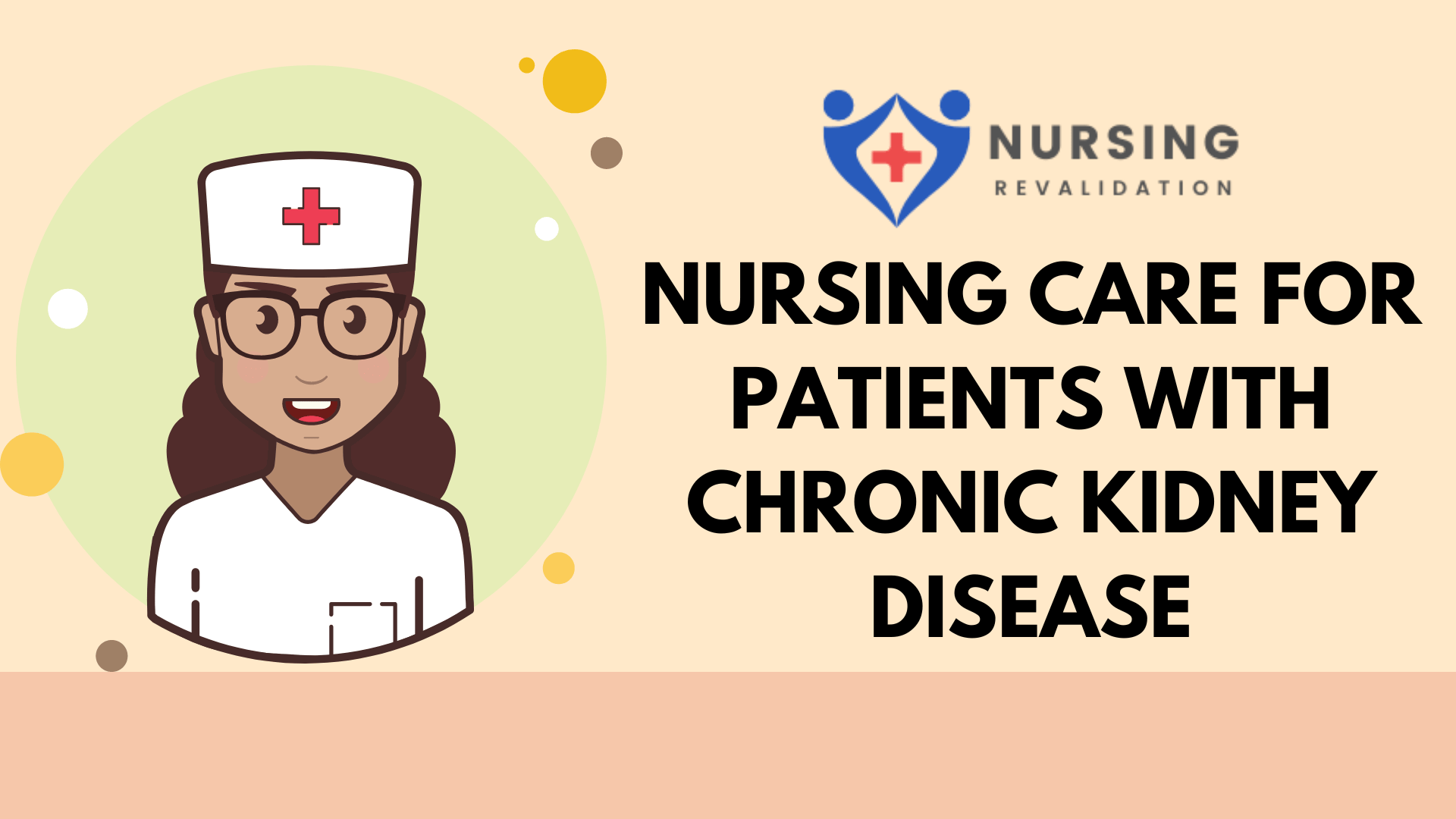Chronic Kidney Disease (CKD) presents a significant challenge in healthcare, affecting millions worldwide. As the prevalence of CKD continues to rise, nurses play a crucial role in providing comprehensive care and support to patients throughout their journey. In this article, we delve into the complexities of nursing care for CKD patients, exploring strategies, challenges, and best practices to optimize patient outcomes.
Understanding Chronic Kidney Disease
Definition and Stages of CKD
Chronic Kidney Disease is characterized by the gradual loss of kidney function over time. The National Kidney Foundation defines CKD as the presence of kidney damage or decreased kidney function for three months or longer. The disease progresses through five stages, with Stage 1 being the mildest and Stage 5 indicating kidney failure.
Epidemiology and Risk Factors
CKD affects approximately 10% of the global population, with diabetes and hypertension being the leading causes. Other risk factors include obesity, smoking, family history of kidney disease, and aging. Understanding these risk factors is crucial for early detection and intervention.
Table: Commonly Prescribed Medications for CKD Management
| Medication Class | Examples |
|---|---|
| Antihypertensives | ACE Inhibitors (e.g., Lisinopril), ARBs (e.g., Losartan), Calcium Channel Blockers (e.g., Amlodipine) |
| Erythropoiesis-Stimulating Agents (ESAs) | Epoetin Alfa, Darbepoetin Alfa |
| Iron Supplements | Ferrous Sulfate, Ferric Citrate |
| Phosphate Binders | Calcium-Based Binders (e.g., Calcium Carbonate), Non-Calcium Binders (e.g., Sevelamer) |
| Diuretics | Furosemide, Hydrochlorothiazide |
| Analgesics | Acetaminophen, Nonsteroidal Anti-Inflammatory Drugs (NSAIDs) |
| Antiemetics | Ondansetron, Metoclopramide |
Nursing Assessment and Diagnosis
Comprehensive Health Assessment
Nurses play a vital role in conducting thorough health assessments to identify CKD risk factors and symptoms. This includes assessing blood pressure, performing urinalysis, and monitoring renal function tests such as serum creatinine and estimated glomerular filtration rate (eGFR).
Diagnosis and Collaborative Care
Once diagnosed, CKD management requires a collaborative approach involving nurses, physicians, dietitians, and other healthcare professionals. Nurses facilitate patient education, medication management, and lifestyle modifications to slow disease progression and manage complications.
Management of CKD Complications
Hypertension Management
Hypertension commonly accompanies CKD and exacerbates renal damage. Nurses monitor blood pressure closely and educate patients on lifestyle modifications and medication adherence to control hypertension effectively.
Anemia and Iron Deficiency
CKD often leads to anemia due to decreased erythropoietin production and iron deficiency. Nurses administer iron supplements, monitor hemoglobin levels, and collaborate with physicians to initiate erythropoiesis-stimulating agents (ESAs) when indicated.
Fluid and Electrolyte Imbalance
Patients with CKD are at risk of fluid and electrolyte imbalances, which can lead to complications such as hyperkalemia and fluid overload. Nurses monitor fluid intake, restrict dietary potassium, and administer diuretics as prescribed to maintain electrolyte balance.
Nutritional Management
Dietary Counseling
A crucial aspect of nursing care for CKD patients involves providing dietary counseling to manage protein, sodium, potassium, and phosphorus intake. Nurses collaborate with dietitians to develop individualized meal plans that meet nutritional needs while minimizing stress on the kidneys.
Fluid Restriction
Fluid restriction is essential in managing fluid overload and hypertension in CKD patients. Nurses educate patients on fluid intake limits and monitor adherence closely to prevent complications such as edema and pulmonary congestion.
Psychosocial Support
Emotional Well-being
Living with CKD can take a toll on patients’ emotional well-being, leading to anxiety, depression, and feelings of isolation. Nurses provide empathetic support, assess mental health status, and refer patients to counselors or support groups as needed.
Financial Counseling
CKD management can impose a significant financial burden on patients and their families due to medical expenses and potential loss of income. Nurses connect patients with financial resources, insurance assistance programs, and social services to alleviate financial stress and improve access to care.
End-Stage Renal Disease (ESRD) and Dialysis
Preparation for Renal Replacement Therapy
For patients progressing to End-Stage Renal Disease, nurses play a crucial role in preparing them for renal replacement therapy options, including hemodialysis, peritoneal dialysis, and kidney transplantation. This involves education, psychosocial support, and coordination with nephrology teams.
Dialysis Care
Nurses provide comprehensive care to patients undergoing dialysis, including vascular access care, vital signs monitoring, and assessment for dialysis-related complications such as hypotension and access site infections. Patient education on self-care and adherence to treatment regimens is paramount for optimal outcomes.
Palliative Care and Symptom Management
Pain Management
CKD patients may experience chronic pain related to underlying kidney disease or comorbidities such as peripheral neuropathy and osteoarthritis. Nurses assess pain levels, implement pharmacological and non-pharmacological interventions, and advocate for adequate pain control to enhance quality of life.
Symptom Control
Effective symptom management is essential in improving CKD patients’ quality of life, particularly in advanced stages of the disease. Nurses address symptoms such as fatigue, nausea, pruritus, and dyspnea through holistic approaches that encompass physical, psychological, and spiritual aspects of care.
Conclusion
Nursing care for patients with Chronic Kidney Disease requires a holistic approach that addresses medical, nutritional, psychosocial, and palliative care needs. By providing comprehensive assessment, education, and support, nurses empower CKD patients to manage their condition effectively and improve their overall well-being. As frontline caregivers, nurses play a pivotal role in enhancing CKD patients’ quality of life and promoting optimal health outcomes.

